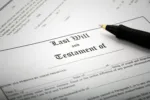Ensuring Peace of Mind: Best Practices for Preparing a Will and Securing Your Beneficiaries’ Future

Preparing a will is a cornerstone of estate planning, ensuring that your assets are distributed according to your wishes. A well-crafted will provides clarity, minimizes potential disputes around your estate and, most importantly, secures the financial well-being of your loved ones. In this blog, we will delve into the best practices for preparing a will, emphasizing the importance of a comprehensive checklist and understanding the role of beneficiaries.
The Preparing a Will Checklist: A Roadmap for Peace of Mind
1. Assessing Your Assets
Before preparing your will, take stock of your assets. This includes properties, financial accounts, investments and personal belongings. Making a comprehensive list sets the foundation for equitable distribution among your beneficiaries.
2. Choosing an Executor
Selecting a trustworthy and responsible executor is a critical decision in the will preparation process. This individual will be responsible for executing your wishes, handling the administrative tasks and ensuring a smooth transition of assets to the beneficiaries.
3. Legal Assistance
Engage the services of a qualified estate planning attorney to guide you through the intricacies of the legal process. A professional can help you navigate the specific laws governing wills in your jurisdiction, minimizing the risk of errors and challenges in the future.
4. Clearly Define Beneficiaries
Explicitly outline which family members, friends and/or charitable organizations will inherit your assets and be specific in your descriptions. Being as clear as possible helps prevent confusion and potential conflicts among beneficiaries.
5. Contingency Planning
Life is unpredictable. Circumstances may change. Consider including contingency plans in your will, accounting for unexpected events such as the passing of a beneficiary or changes in your financial situation.
The Beneficiary in a Will: Navigating Roles and Responsibilities
1. Communication is Key
Clearly communicating your intentions to your beneficiaries lowers the likelihood of disputes. This transparency allows beneficiaries to fully understand their roles and responsibilities in executing your wishes.
2. Educate Your Beneficiaries
Provide your beneficiaries with information about their inheritance. This includes details about the nature of assets, potential tax implications and any specific conditions or restrictions attached to their inheritance.
3. Regularly Update Your Will
As your life evolves, so should your will. Periodically review and update your will to reflect any changes in your financial situation, family dynamics or legislative alterations so that it remains relevant and legally sound.
4. Consider Professional Guidance for Beneficiaries
For complex estates or significant inheritances, beneficiaries may benefit from seeking professional advice. Financial planners, estate lawyers or tax consultants can guide them through the process of managing their inheritance.
A Legacy of Clarity and Security
Preparing your will paves the way for a seamless transition of assets and a secure financial future for your loved ones. Some of the best practices for estate planning and will preparation involve open communication, education and periodic reassessment. Envision your will not only as a legal document but as a legacy of clarity, peace of mind and financial security for generations to come.



